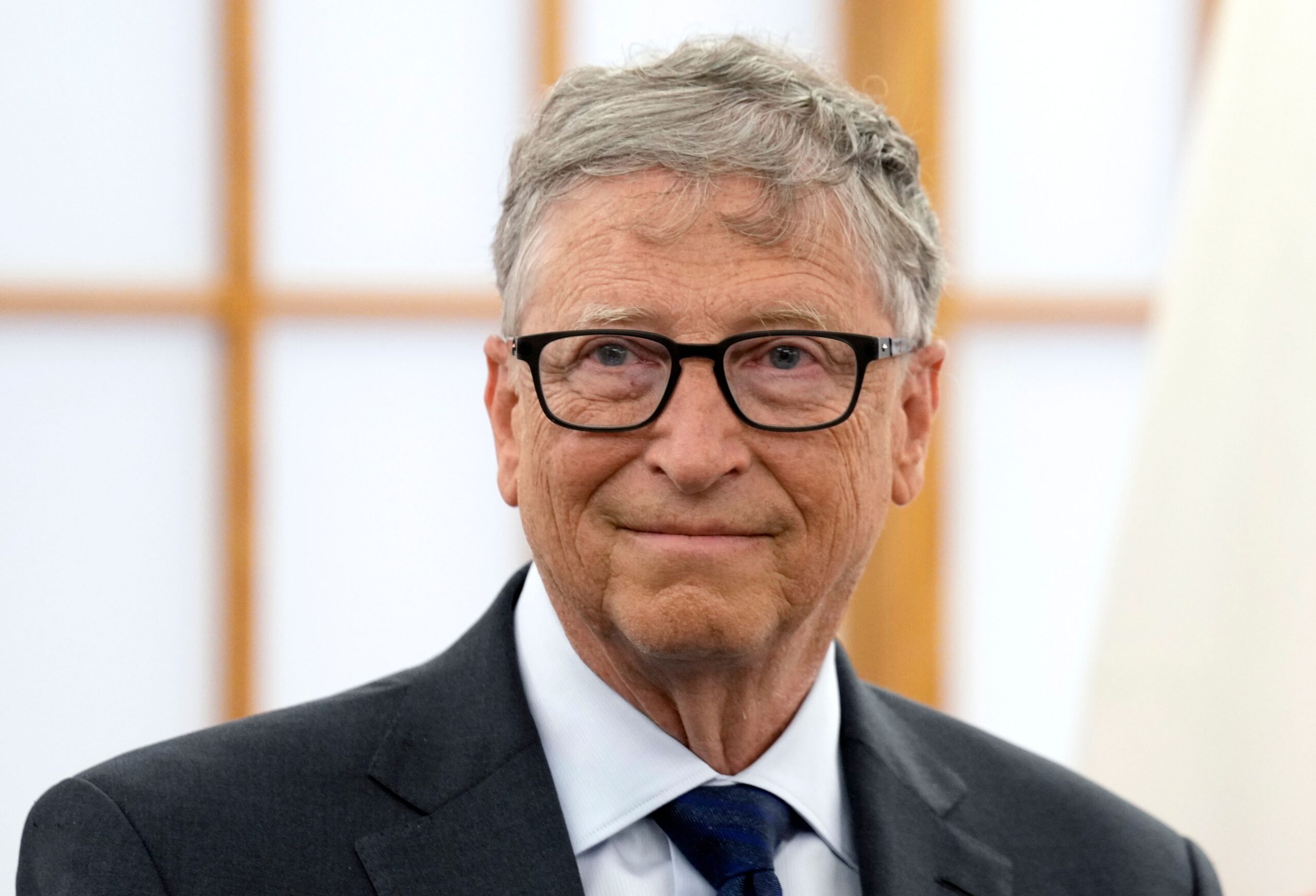
Bill Gates (shutterstock)
Don’t you just love stories about people giving back?
While there’s a lot of greed out there, some of the richest people on Earth realize how lucky they are and decide to share the wealth.
Just look at Jeff Bezos of Amazon and his decision to donate $100 million to food banks. It’s a lot more than you and I (and several large families put together) will ever give to charity… Because it’s more than we’ll earn in our entire lifetimes.
It’s more than you could fit in the trunk of your car in stacks of $100 bills! If you put it all in a basic savings account, you and me and those several families could all easily live off the interest alone!
Actually, when you think about it like that, it’s kind of more money than any one person could ever need or even spend on anything normal…
Sure, if you want to travel the world in a luxury blimp, eating meals out of the skulls of dead celebrities, you could spend it all pretty easily. But if you’re just trying to have a happy, comfortable life, $100 million isn’t much better than an $80,000 salary.
Fixing the World’s Problems
So why doesn’t any of these mega-billionaires like Jeff Bezos, Michael Bloomberg, Elon Musk, or any one of the Walmart Waltons just give away their riches and go down in history as the person who ended world hunger? At an estimated cost of $20 billion a year, each of them could afford to end homelessness in America for between two and eight years.
They could even keep a few car trunks stuffed with hundreds so they could continue living like kings and hunting olympic athletes for sport. And imagine how much all those people could improve their lives if they had stable places to live and sleep.
It must not be that simple… Because if private greed was the only thing standing in the way of transformational change, governments could have collected all that wealth with some steep taxes and made the world a better place. There has to be some reasonable explanation for why these people don’t just give it all away…
In this series we are looking at a number of prominent myths around philanthropy, including the notions that billionaires’ “wealth” is substantially different than money, and that they are important patrons of the arts.
Previously we debunked the ideas that charity is better than “government handouts” and that it’s even possible for billionaires to be generous, but today we’ll look at the question of whether their private charitable foundations are powerful forces for good.
Myth: Those foundations do a lot of good though
The Myth: They might not be as good as well-funded government programs, but in the absence of the political will to raise taxes and establish those kinds of programs, the private charitable foundations of billionaires do a lot of good and are a great option for helping people in need.
Why It’s Wrong: There’s no doubt that some of those foundations have truly helped people in significant, life-changing ways. But, generally speaking, the stated charitable missions of these organizations are secondary to their function as tax havens.
Adam Ruins Everything – Why Billionaire Philanthropy is Not So Selfless | truTVwww.youtube.com
In the past these organizations were a useful way for anyone lucky enough to be leaving assets in excess of ~$600,000 to their loved ones to avoid the estate tax. These days the estate tax has been gutted to the benefit of no one who has ever earned anything, and the amount has been pushed above $11,000,000. But there are plenty of people who still want that loophole or enjoy the prestige that private charitable foundations provide them.
Often private LLCs directly controlled by the billionaire funders, these foundations allow for income not only to evade income tax, while earning the donor a tax deduction on top of that. Of course in order to qualify for these benefits, the organization must meet the requirements of a non-profit, but the standards aren’t exactly strict.
What Billionaires Want
Not only can the organization focus only on the issues that matter most to a person with ungodly amounts of money (a cure for all the papercuts they get from flipping through their stacks?), they only need to spend 5% of their investment assets annually. And they could choose to spend that amount on administrative costs and salary for the friends/lackeys they’ve chosen to run them.
You basically have to be as blatantly self-serving and corrupt as Donald Trump—spending other people’s money to buy a portrait of himself—to come under any real scrutiny, and even then it’s only if you’re running for president…
On top of that, these foundations are free to grow their assets through investments—even in for-profit industries that work in diametric opposition to the foundations’ stated goals. Consider the fact that—until Bill Gates was publicly shamed into divesting—the Bill and Melinda Gates Foundation was heavily invested in fossil fuel companies.
Apart from their horrifying impact on climate change, these companies are among the worst offenders on Earth in terms of polluting fresh water resources. If only there was a charitable foundation that was focused on preserving and cleaning water supplies in developing countries. Like, for instance, the WASH program…of the Bill and Melinda Gates Foundation.
Worse still, many so-called charitable donations end up going to think tanks, university branches, and political advocacy groups that fund and promote research and policy initiatives that support the interests of the wealthy.
The effect is to amplify ideas that ultra-wealthy already believe and what they want to be true. If you were a researcher who had reason to believe that increasing the top marginal tax rate to 90% could solve all of our nation’s most pressing problems, you would struggle to get your research funded. But if you managed to complete it and get it published, there would immediately be 10 well funded studies seeking to disprove it.
The Bill Gates Approach to “Fixing” Education
Look again at the Bill and Melinda Gates Foundation. Not only does it give a lot of money to so-called good causes that primarily serve the wealthy, but even when the foundation is focused on trying to do actual good they often end up hurting more than they help.
Among its primary focuses has been revamping America’s public school systems, which has involved billions of dollars being spent on various initiatives to change the way teachers are trained, the way children are taught, and the way schools themselves are organized—all with an emphasis on data collection and standardized testing.
Among the complaints against how the Foundation operates is the fact that its model of reform and success involves little input from educators and that Bill Gates himself essentially steers the ship with little resistance from within the organization. And the results have been…less than stellar.
Obviously the goal of improving the education system for everyone is admirable, but the allure of Gates’ money and his supposed genius has tempted state and local governments to match his initiatives with a lot of money of their own.
And time after time those initiatives have been abandoned as soon as they don’t yield the results Gates was looking for—leaving schools and municipalities on the hook for cleaning up the mess without that financial backing.

From Common Core to smaller schools to creepy data mining, Gates’ ideas have faltered or crumbled when they meet with the real world, and they’ve ended up costing the communities they “serve” a lot more than they’ve ever cost him. At this point you could argue that the biggest accomplishment the foundation has achieved is rehabilitating Bill Gates’ predatory reputation.
But he is way too rich to be ashamed of his failures. So Bill Gates just keeps going and pushes his narrow-minded views on education even harder. These days he’s helping New York Governor Andrew Cuomo with the idea that we don’t even need classrooms…
Stricter Standards for “Charity”
So while claims that Bill Gates is using vaccines to spread the mark of the beast and practice eugenics are a bit wild, the work of these private charities definitely deserve more scrutiny.
Basically, even when these private foundations aren’t glorified tax shelters, they’re still awful. As well-intentioned as some billionaires might be, they are too powerful, too used to getting their way, and too detached from real life to be much use in helping people.
In other words, we need to make the standards for these foundations far stricter—to make sure they’re doing some actual good in exchange for their tax evasion—and once we’ve done that, we need to tax the hell out of all the billionaires’ money so they remember what it’s like to be human.
And if you’re thinking that we can’t do that—because all that wealth is tied up in investments—we’ll have to cover that myth in the next installment.











